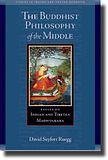Buddhist Philosophy of the Middle
Ruegg, David Seyfort:
The Buddhist Philosophy of the Middle : essays on Indian and Tibetan Madhyamaka / David Seyfort Ruegg. - Boston : Wisdom Publications, 2010. - XXII, 442 S - (Studies in Indian and Tibetan Buddhism)
ISBN 978-0-86171-590-9 / 0-86171-590-x
US$ 39,95
DDC: 181.04392; 294.392
-- Angekündigt für November 2010 --
Beschreibung
Madhyamaka, the “philosophy of the middle,” systematized the Buddha's fundamental teaching on no-self with its profound non-essentialist reading of reality. Founded in India by Nagarjuna in about the second century c.e., Madhyamaka philosophy went on to become the dominant strain of Buddhist thought in Tibet and exerted a profound influence on all the cultures of East Asia. Within the extensive Western scholarship inspired by this school of thought, David Seyfort Ruegg's work is unparalleled in its incisiveness, diligence, and scope. [Verlagsinformation]
Inhalt
Foreword / by Tom Tillemans. ix
Preface. xiii
Abbreviations. xix
1. Mathematic and Linguistic Models in Indian Thought: the Case of Zero and Śūnyatā [1978]. 1
2. Towards a Chronology of the Madhyamaka School [1982]. 13
3. The Uses of the Four Positions of the Catuṣkoṭi and the Problem of the Description of Reality in Mahāyāna Buddhism [1977]. 37
4. Le Dharmadhātustava de Nāgārjuna [1971]. 113
5. On the Authorship of some Works ascribed to Bhā(va)viveka/Bhavya [1990]. 145
6. The Svātantrika-Prāsaṅgika Distinction in the History of Madhyamaka Thought [2006]. 159
7. Purport, Implicature, and Presupposition: Sanskrit abhiprāya and Tibetan dgongs pa / dgongs gzhi as Hermeneutical Concepts [1985]. 195
8. An Indian Source for the Tibetan Hermeneutical Term dgongs gzhi, "Intentional Ground" [1988]. 213
9. Some Reflections on the Place of Philosophy in the Study of Buddhism [1995]. 217
10. On the Tibetan Historiography and Doxography of the "Great Debate of Bsam yas" [1992]. 253
11. Autour du Lta ba'i khyad par de Ye shes sde [1979]. 267
12. The Jo nang pas: A School of Buddhist Ontologists according to the Crystal Mirror of Philosophical Doctrines (Grub mtha' shel gyi me long) [1963]. 289
13. A Karma Bka' brgyud Work on the Lineages and Traditions of the Indo-Tibetan dBu ma (Madhyamak) [1988]. 323
14. La pensée tibétaine (accompagnée d'une traduction du Rten 'brel bstod pa legs bshad snying po de Tsong kha pa) [1989]. 357
15. The Indian and the Indic in Tibetan Cultural History, and Tsong kha pa's Achievement as a Scholar and Thinker ... [2004]. 375
English Glossary of Selected Terms. 399
Publications by David Seyfort Ruegg. 407
Indexes. 419
Autor
DAVID SEYFORT RUEGG was born in 1931 in New York. His university education was primarily in Paris, where he studied Indology under Jean Filliozat and Louis Renou and Tibetology under Marcelle Lalou and Rolf Stein. Seyfort Ruegg's work has ranged over most aspects of Indian and Tibetan Studies. However two interests come back repeatedly: the philosophy of the buddha-nature (tathagatagarbha) and the philosophy of the middle. David Seyfort Ruegg has held professorial positions in several major universities: Leiden, Seattle, Hamburg, and now the School of Oriental and African Studies of the University of London. He is a Sanskritist and a Tibetologist and at one time or another has held chairs in Indian Philosophy, Buddhist Studies, and Tibetan. Wikipedia [en].
Quellen: Wisdom Publications; WorldCat; Amazon; Barnes & Noble; WorldCat
Ähnlich
- Santideva and Bodhicaryavatara
- Nāgārjuna's Middle Way
- Ornament of Reason
- Nagarjuna
- Schmithausen: The Genesis of Yogācāra-Vijñānavāda
- dBu ma tshig gsal gyi ti ka (Part 1)
- The Refutation of the Self in Indian Buddhism
- Eltschinger: Caste and Buddhist Philosophy
- Tāranātha no dBu ma theg mchog kenkyū
- Visions of Unity

